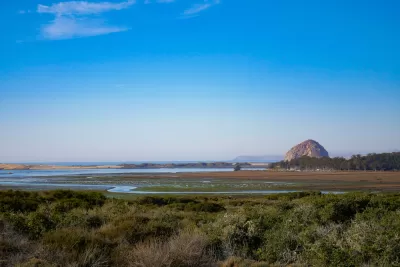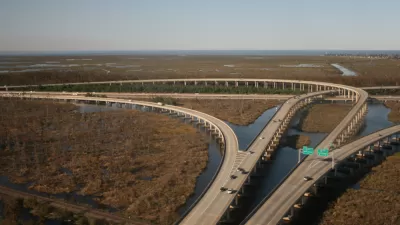Climate change and coastal development are combining to stamp out important ecological landscapes.

Ninety percent of California's wetlands have been lost to development, researchers say—and 100 percent of the marshes remaining could disappear by the end of the century if greenhouse gas emissions don't decrease.
The marshes would have a shot at survival if they could migrate inland, but coastal development patterns are boxing them in, a USGS researcher told KPCC. USGS and UCLA co-authored the new study that calculated the threat to California's coastal ecology.
Besides providing important habitats for millennia, marshes "serve key functions related to the health of the planet," KPCC's Jacob Margolis explains. Their decay could result in even more emissions, as well as erosion and water pollution.
They store carbon, which will be released as they begin to die off. They are barriers to storm surges that protect against erosion. They act as catches for debris that make their way down from the hills after wildfires. And they filter polluted water and sediment that flows from our cities towards the ocean, keeping our seas a bit cleaner.
Further explanation, and a picture slideshow, are included in the full story.
FULL STORY: California's coastal marshes could be washed out to sea by 2110

Planetizen Federal Action Tracker
A weekly monitor of how Trump’s orders and actions are impacting planners and planning in America.

Maui's Vacation Rental Debate Turns Ugly
Verbal attacks, misinformation campaigns and fistfights plague a high-stakes debate to convert thousands of vacation rentals into long-term housing.

Restaurant Patios Were a Pandemic Win — Why Were They so Hard to Keep?
Social distancing requirements and changes in travel patterns prompted cities to pilot new uses for street and sidewalk space. Then it got complicated.

In California Battle of Housing vs. Environment, Housing Just Won
A new state law significantly limits the power of CEQA, an environmental review law that served as a powerful tool for blocking new development.

Boulder Eliminates Parking Minimums Citywide
Officials estimate the cost of building a single underground parking space at up to $100,000.

Orange County, Florida Adopts Largest US “Sprawl Repair” Code
The ‘Orange Code’ seeks to rectify decades of sprawl-inducing, car-oriented development.
Urban Design for Planners 1: Software Tools
This six-course series explores essential urban design concepts using open source software and equips planners with the tools they need to participate fully in the urban design process.
Planning for Universal Design
Learn the tools for implementing Universal Design in planning regulations.
Heyer Gruel & Associates PA
JM Goldson LLC
Custer County Colorado
City of Camden Redevelopment Agency
City of Astoria
Transportation Research & Education Center (TREC) at Portland State University
Jefferson Parish Government
Camden Redevelopment Agency
City of Claremont





























